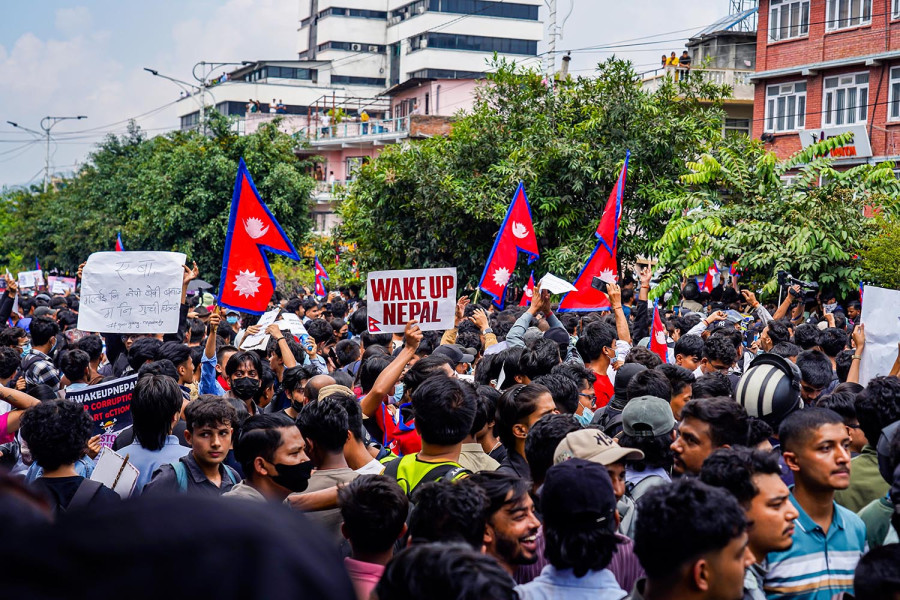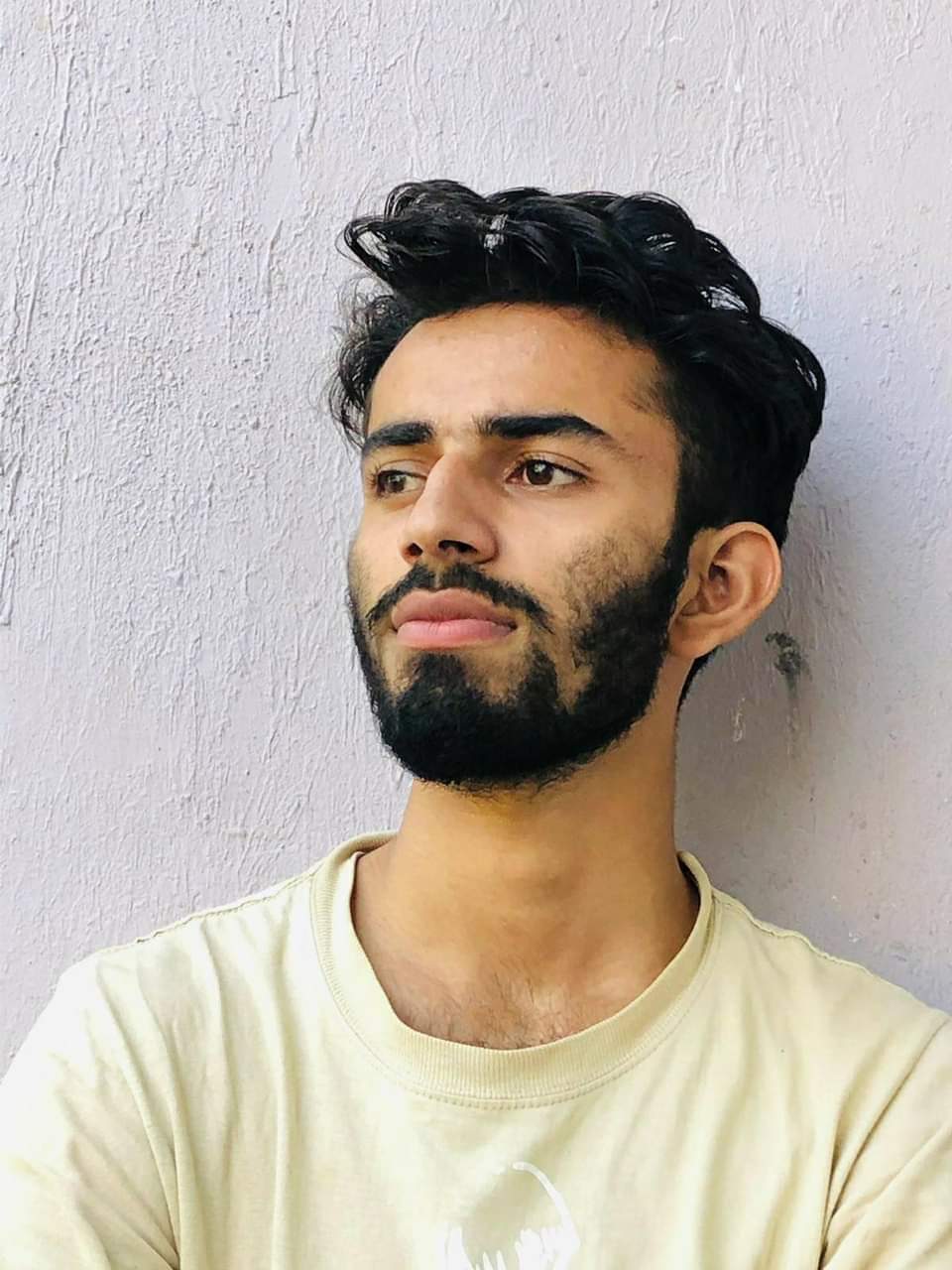Fiction Park
From campus corridors to protest streets
Torn between exams and expectations, Shree discovers a new sense of purpose when he joins a generation rising against corruption.
Sugam Gautam
As perplexed as his cohorts across the country, Shree, reluctantly and halfheartedly, dragged himself to the gates of his college every day. Back in the village, many of his childhood friends had already left for the Gulf, and others for Europe and Australia. A son was all his parents had, and they would not send the apple of their eyes to some distant, alien lands.
Shree was also uncertain whether to go abroad or continue working hard in the country. Unlike other youths his age, he took a practical approach to life, never dreaming beyond his means. He never pretended to have a lavish lifestyle, wasting money or talking boastfully. All he wanted from life was a stable job that paid his bills. When he failed his second-year exams, he realised his shortcomings, and a realisation hit him that his life wouldn’t be a smooth ride.
That night, when his results were announced, he slapped himself and wept, letting the tears stain the only pillow he had fetched from his village house. What would he say to his expectant parents who spoke highly of him in the remote village of Parbat? “He’s studying in Pokhara. It will ruin his studies if he starts working,” the parents would retort to the villagers’ inquiries about their son.
For a few days after the results, he cursed himself and believed that his ambivalence had caused his failure. Had he not listened to his parents, he might have gone to countries where exams and uncertainties about life wouldn’t trouble him. But if he had stood his ground and persuaded his parents, they wouldn’t have prevented him from pursuing his exotic dreams.
In his class, there were other friends from outside the city, all somewhat resembling Shree. His benchmate Apil, from Pokhara, was a carefree person who partied more than he studied. On Friday nights, he was often seen around Lakeside, visiting nightclubs and inexpensive bars. “There is nothing to do sitting at home, so I just come to college to pass my idle time,” he would say when Shree inquired about his casual attitude. Meanwhile, students in the front rows were renters; they were modest and hardworking.
Apil, with whom Shree interacted daily, seemed sophisticated and talked beyond studies. He touched on politics, business, bureaucracy, and whatnot when he started talking. Surprisingly, his results didn’t reflect his energy and personality; he was as good as Shree but not as talented as students in the front rows. Shree wondered whether other people could read this ostentatious behaviour of Apil. Sometimes, he felt pity for Apil, his showy personality; Apil knew nothing from inside, yet walked around with an aura of a sagacious scholar.
One evening, Apil joined Shree on his usual walk from Rastra Bank Chowk to the lush park at Sahid Chowk. They discussed trivial matters, perhaps about college girls and how their long, dark hair swayed in the July summer. Shree brushed it off when Apil started probing into more personal topics, like which particular girl from college he wanted to go out with. Shree didn’t have a symmetrical face or captivating eyes, but he wasn’t the ugliest boy either. He fell into the moderate category in nearly every aspect of life. It seemed as if the word ‘medium’ perfectly suited him.
As they walked along the streets, Apil’s gaze fell on the newspaper stand and, with the curiosity of an avid reader, he stopped by and grabbed a copy. Shree observed him and inwardly commented on how foolish he was. “I told my parents that I failed my exams, and they said it happens sometimes. But I know they are hurt,” Shree said in one breath as Apil tried to keep up with Shree’s pace.
Apil was flipping through the paper as they walked. “Forget it. You can always pass it. And of course, a single sheet of paper can’t decide your future. No?” Apil giggled. At times, Shree envied Apil, who, even after failing, kept his composure and acted as if it was not a big deal. Shree also knew that such a lax attitude stemmed from his family’s healthy financial position. Meanwhile, Shree’s future would determine his family’s position in society.
“What a nonsensical bunch of leaders. All they do is blame each other and seek public sympathy,” Apil gritted his teeth and dumped himself onto a low cemented bench. Without a word, Shree settled himself beside Apil, craning his neck over the paper Apil was pretending to read. “Gen Z declared this protest against corruption and poor governance. We should go too. If not us, who will raise a voice against the corrupt leaders?” Apil’s anger escalated, a frown materialising on his face all of a sudden.
Shree, slightly irritated, retorted, “Look, I’m not into it. I have no energy to fight against the elites. I have exams to pass. And also, who will take care of my public service exam?” A wave of sadness took over Shree as he thought of the path ahead—the expectation of his parents and the cruel competition. “You’re being stupid now. Job scarcity and low pay scale are also linked to these leaders’ performance. It’s your foolishness that you’re not realising you’re affected by the state’s indifference to our concerns,” Apil remarked and dived into one of his thoughtful episodes.
Not being able to resist Apil’s patriotism and his call for unity, Shree sighed and replied with a nod, adding, “Okay, we can join the Gen Z protest.” As it came out of his mouth, Shree realised he had spelled “Gen Z” for the first time. Of course, he had seen it repeatedly on his phone, but he had never spelled it. The most embarrassing thing was that Shree didn’t exactly know what “Gen Z” meant; all he knew was that it represented young, tech-savvy people.
Back in his dingy room with limited furniture, he collapsed on the mattress and typed ‘Gen Z’ on Google. Only then did he become aware of the age group falling under the Gen Z category. He wondered if Apil knew this or if he was as uninformed as Shree. Later, on September 7, Apil missed class, and Shree thought he had probably been bored and fell asleep in the morning.
No texts were exchanged between them till 2 in the afternoon. With nothing better to do, Shree decided to call Apil so that he could kill time, listening to his stupid commentary on a wide array of subjects. Sadly, there was no response. Even the second call went unanswered. But in a while, Shree got a call from Apil. “I’m on the way to Kathmandu with my brothers. I’ll call you later,” Apil panted as if he was sandwiched between gigantic wrestlers. “What for? When? You didn’t mention a thing about it.” Shree’s curiosity was obvious.
“Of course, in the protest. Gen Z protest,” Apil said and hung up the phone, giving the impression he wasn’t interested in talking to someone unconcerned about the protest. It made Shree wonder why his friend hadn’t asked him to go to Kathmandu. Was it because Apil thought Shree wouldn’t be interested in rebelling against the elites? Did Apil forget that Shree had agreed to join the protest when asked? Certainly, Shree wouldn’t travel to Kathmandu solely for the protest; he had agreed to participate in the Pokhara demonstration instead. “Apil is a psychopath,” Shree thought to himself.
Like any other day, the sun came out in its usual form, casting yellow on Machhapuchhre. Motorbikes in large numbers plied the streets, heading to Sabagriha Chowk, a place where the Gen Z group staged a protest. Shree hadn’t gone to the college and was getting ready to go to the venue. As he walked towards the venue, the bustling atmosphere indicated that it was not one of those regular protests. Thousands of youths had gathered at the venue, placards and flags hoisted above their heads. A sudden goosebumps seeped into his bones as the mob collectively chanted, “Hamro desh pran bhanda pyaro cha.” After that, raging outcries against corruption filled the streets. The united and undeterred mob started rallying, their cries getting more intense. They continued like that for hours, and in the crowd, someone shouted that people were shot to death in Kathmandu.
The news provoked them even more. Then they heard that more people were killed. Shree was drenched in sweat, but he didn’t care. He was proud to be one of those protestors. In the evening, someone in the crowd opened his phone and showed a bloodied, discarded white shoe on the street. Shree suddenly felt cold as his eyes focused on the picture. He gathered that Apil used to wear one like that, but it could be someone else’s too.
What did it matter if it was Apil’s or someone else’s? The person was one of their comrades, and as he realised that, he didn’t care if someone shot him right there. It would be entirely different the next day; a calm Shree coming to the protest in the morning died that evening. A furious and deeply wounded Shree would go and cry on the streets the next day, and nothing would be above his anger. Nothing.
Gautam is a writer from Pokhara.




 21.12°C Kathmandu
21.12°C Kathmandu










